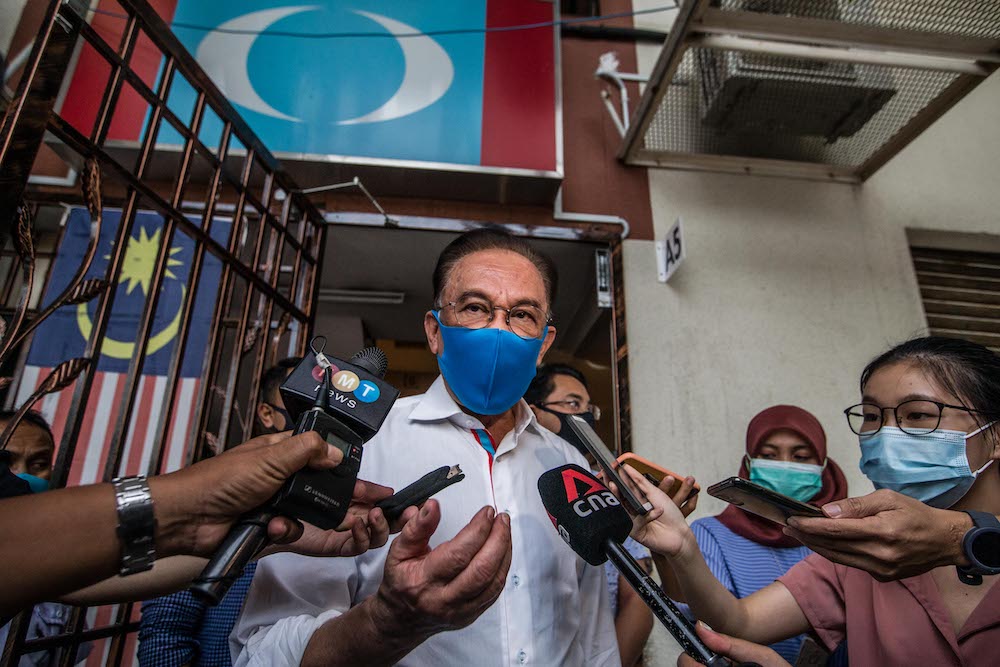Subscribe to our Telegram channel for the latest updates on news you need to know.
KUALA LUMPUR, Feb 9 — Datuk Seri Anwar Ibrahim has penned a sharp critique of Tan Sri Tommy Thomas’ memoir that, among others, alludes to the remarks of the former attorney general (AG) to racial stereotyping.
Anwar said Thomas made flawed and “fatal” conclusions about several issues in a memoir that has become the subject of dozens of investigations, including casting “unkind remarks” about the Attorney General’s Chambers that implied its mostly Malay staff as being lazy.
The police have received over 130 complaints, mostly from the Malay community, against reported remarks supposedly contained in Thomas’ recently released memoir, My Story: Justice in the Wilderness.
“At one fell swoop, Thomas has not only insulted the AG’s Chambers but publicly disparaged the entire civil service of the nation,” Anwar, a former senior member of the civil service, said in a lengthy critique on Facebook.
“The notion that civil servants are in service just to earn fixed salaries with the only ambition to collect their pensions when they retire is the sort of resentment founded in anger and slight, not rational criticism.
“Such a gross generalisation is unbecoming,” he added.
Anwar was responding to an excerpt in Thomas’ book that had been reported by some news outlets: “public sector lawyers had public service attitudes (and) were civil servants, earning a fixed monthly income”, a statement that seemingly suggested they lacked initiative and are keen only on “awaiting pension upon retirement”.
The former deputy prime minister also suggested Thomas was ill-informed about the problems regarding racism, citing a chapter the former AG had dedicated on the issue in his memoir.
The Opposition leader said Thomas’ inclination to blame racism solely on Malay political leaders was shallow and akin to saying racism only exists among one community, a malady Anwar felt was also inherent in other races.
The Port Dickson MP argued that racism was a systemic, cultural, and political problem that pervades all races, and that Thomas being a lawyer who professed to side justice should have been aware of.
“Appropriate enough of an issue, but unfortunately, and to my great disappointment, this comes off as somewhat one-sided with the preponderance of the blame being levelled on Malay leaders, giving the impression that racism is a malady afflicting only the Malay community,” Anwar wrote.
“Not one word is said about the racism that is inherent among the other communities as well and this is yet another fatal misstep,” he added.
“I am sure Thomas knows that what is good for the goose is also good for the gander. But failing to recognise that racism in Malaysia is a systemic cultural and political problem, which has been exacerbated by government policies, his words offer little value to the discussion we all need to be having.”
The police have opened three defamation investigation papers to probe the contents of Thomas’ book, which detractors claimed defamed and insulted various parties.
Bukit Aman CID director Datuk Huzir Mohamed the police had received 134 reports against Thomas to date.
Despite his criticism, Anwar defended Thomas’ right to express his views and said that he found the call to ban the latter’s book disturbing.
“As much as I subscribe to the belief that I am entitled to exercise my right to criticise Thomas’s book, I vehemently oppose any move to ban it,” Anwar wrote.
“I believe that, subject to the laws of slander and libel, criminal defamation, Thomas should be allowed to exercise his constitutional freedom of expression in a manner that would foster the public contestation of ideas.”


